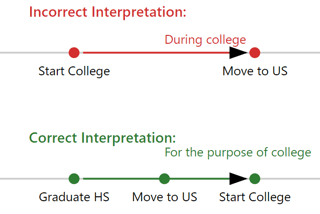Your friend is correct. This から means "from" or "since". She is saying she was somewhere else but moved to America when she started university.
EDIT: In this case, "I went to the US when I was in college" is actually a bad translation, because it means she moved to the US after entering a college (in Japan). 大学からアメリカに行った means she moved (from Japan) to the US after graduating from a high school in Japan and before entering a college in the US. And this usually also implies she moved for (the purpose of entering) college, right?

To generalize this discussion a bit, let's consider this example. Which is the more natural translation of this perfectly natural Japanese sentence?
彼は来月からドイツに行きます。
- He will go to Germany from next month.
- He will move to Germany next month.
You would say Sentence 2 is clearly more natural than Sentence 1. (Sentence 1 may be okay if it refers to repeated business trips, but the Japanese sentence refers to a one-time movement.)
In Japanese, AからBに行く is a perfectly valid construction that means starting a stay/life in B beginning at time A, but a literal translation using "from" simply doesn't work well in English. Assuming she is fluent in both languages, this explains why she used から in the Japanese version but rephrased it differently in English.

